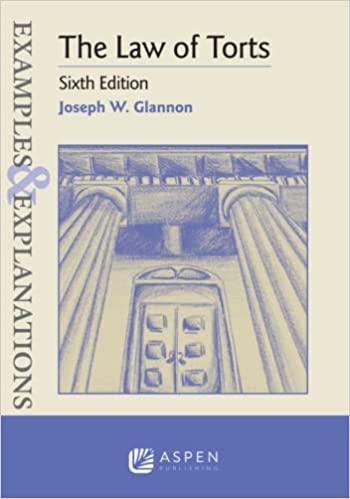Question
1. Stan is charged with felony domestic violence after he allegedly struck his girlfriend in the chest with a baseball bat. At trial, the prosecutor
1. Stan is charged with felony domestic violence after he allegedly struck his girlfriend in the chest with a baseball bat. At trial, the prosecutor will seek to offer evidence that six months earlier, Stan had beaten his former girlfriend with his fists so severely that she went to the hospital for two days. Stan is pleading self-defense, and at trial he will seek to admit evidence that three years earlier, his girlfriend got into a dispute with a store manager while she was shopping and she pushed the manager into a glass table, causing multiple lacerations and requiring him to get over twenty stitches. There is no evidence that Stan knew about the incident with the store manager at the time he struck his girlfriend with the baseball bat. How should the judge rule on these proposed pieces of evidence?
a. The evidence that Stan's girlfriend pushed the manager into a glass table three years ago is admissible, and after that evidence is admitted, the evidence that Stan beat his former girlfriend six months earlier is admissible.
b. Both pieces of evidence are admissible regardless of the order in which they are offered.
c. Both pieces of evidence are inadmissible regardless of the order in which they are offered.
d. The evidence that Stan's girlfriend pushed the manager into a glass table three years ago is admissible, but the evidence that Stan beat his former girlfriend six months earlier is not admissible.
2. Stuart is charged with stabbing a person in an alleyway outside a bar. He is pleading self-defense. During his defense case, his attorney has four character witnesses he wants to call. Which of them is most likely to be allowed to testify?
a. Stuart's boss at work will testify that he has known Stuart for fifteen years and Stuart is a model employee who is never late and has an excellent work ethic.
b. Stuart's father will testify that he has known Stuart his entire life and that Stuart has always been peaceful and never loses his temper.
c. Stuart's best friend will testify that he once saw a person threaten Stuart with a knife, and Stuart never lost his temper, remained calm, and convinced the person to put the knife down.
d. Stuart's wife will testify that she knows Stuart very well and in her opinion he is a very honest person.
3. As part of a sting operation, the Capital City police department sent out an undercover officer to sell cocaine on the street. Thomas was walking by the undercover officer when the officer called him over and convinced him to buy some cocaine. After Thomas bought the cocaine, he was immediately arrested for possessing a controlled substance. At trial, Thomas is using an entrapment defense. Under the laws of his jurisdiction, this defense requires him to prove that he did not have any predisposition to commit the crime and that the law enforcement officer persuaded him to take possession of the drug. In his defense, he calls his friend Terry. Terry will testify that a year ago he was at Thomas' house for a party, and he saw Thomas notice a number of guests snorting cocaine in the corner. Terry will further testify that Thomas became very angry, walked over to the group, and told them to stop and to never use cocaine in his house again. The prosecutor objects to Terry's testimony. Is it admissible?
a. No, because character evidence is generally inadmissible.
b. No, because a party is not allowed to use extrinsic evidence of a specific act to prove character.
c. Yes, the testimony is admissible.
d. No, because Thomas cannot admit character evidence until his character has been attacked by the opposing party.
4. A businessperson filed a defamation suit against a newspaper for printing a column that referred to him as "a nasty miser" and "worse than Ebenezer Scrooge," and accused him of "never performing a real act of charity in his life." During the presentation of the businessperson's case, he wanted to put an agent of the Internal Revenue Service on the stand. The agent is prepared to testify that the businessperson, on his own initiative, reimbursed the IRS for an erroneous overpayment of a tax refund. Counsel representing the newspaper objects.
How is the court likely to rule on the agent's testimony?
a. Admissible, because the businessperson's character is at issue in the case.
b. Admissible, because the businessperson has a right to defend his good character.
c. Inadmissible, because specific instances of conduct are not admissible to prove character.
d. Inadmissible, because it is not probative of any material issue in the case.
Step by Step Solution
There are 3 Steps involved in it
Step: 1

Get Instant Access to Expert-Tailored Solutions
See step-by-step solutions with expert insights and AI powered tools for academic success
Step: 2

Step: 3

Ace Your Homework with AI
Get the answers you need in no time with our AI-driven, step-by-step assistance
Get Started


